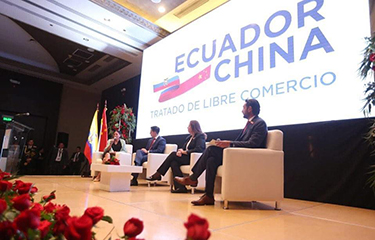The free trade agreement (FTA) signed on 11 May by Chinese Minister of Commerce Wang Wentao and Ecuadorian Minister of Production, Foreign Trade, Investment, and Fisheries Julio José Prado has received a positive response from Chinese seafood distributors, but there are worries among other involved parties that the deal may skew largely in China’s favor.
Bilateral trade between Ecuador and China grew to a record USD 13 billion (EUR 12.1 billion) last year, up 20 percent year-over-year. The value of Ecuadorian shrimp exports to China, in particular, has also been growing consistently. Shrimp exports to China rose from USD 105 million (EUR 97.6 million) in 2017 to USD 615 million (EUR 571.9 million) in 2018. That figure soared to USD 4 billion (EUR 3.7 billion) in 2022, accounting for 60 percent of China’s shrimp imports.
Yet China experienced a trade surplus of USD 609 million (EUR 566.3 million) with Ecuador in 2022, in part due to a surge in exports of automobiles; China is now Ecuador’s top supplier of cars.
With that large of a disparity, China appears to be the biggest beneficiary of the deal, especially given that tariffs on key Chinese exports like cars and machines currently undergo taxation of around 35 percent to 45 percent at Ecuador’s ports. By contrast, Ecuadorian seafood faces tariffs of between 5 percent and 7 percent in China.
Ecuadorian President Guillermo Lasso has suggested the deal will lower costs for business and lead to job creation, but experts including Carolina Viola, the head of the Socio-Environmental Observatory of Chinese Investment in Ecuador, are worried that Ecuador’s workers won’t be able to compete with their Chinese counterparts and that the country will lose important tax revenue.
Viola said there is a danger for Ecuadorian labor standards and pay due to the “asymmetry” of the new trade deal.
With G7 leaders calling out the use of economic coercion by China for geopolitical goals, analysts also debate whether Ecuador’s asymmetric economic reliance on China will hurt its wild-catch fisheries sector, or at least make the country’s government more reluctant to criticize Chinese incidents of illegal fishing on....
Photo courtesy of Ecuadorian Minister of Production, Foreign Trade, Investment, and Fisheries








